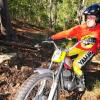If you can't find a decent second hand pipe and still want to use the Feked silencer, a new front pipe for your bike would be a fairly easy thing for a tradesman to make, especially if there is your old one to copy the shape from. As a for-instance, I've seen front pipes for Bultacos and Italjets made from pre-curved architectural tubing (thin wall stainless steel handrail material) that look excellent


